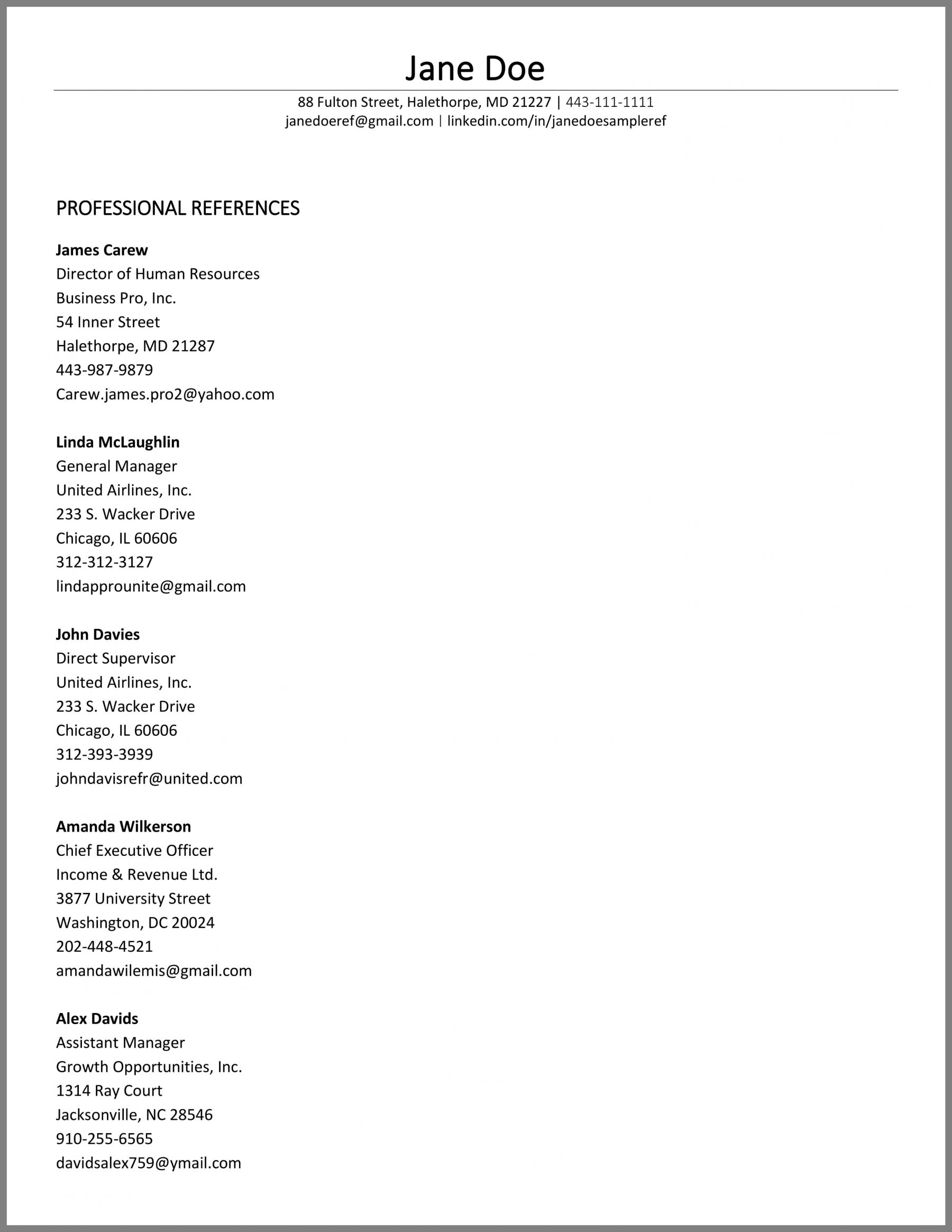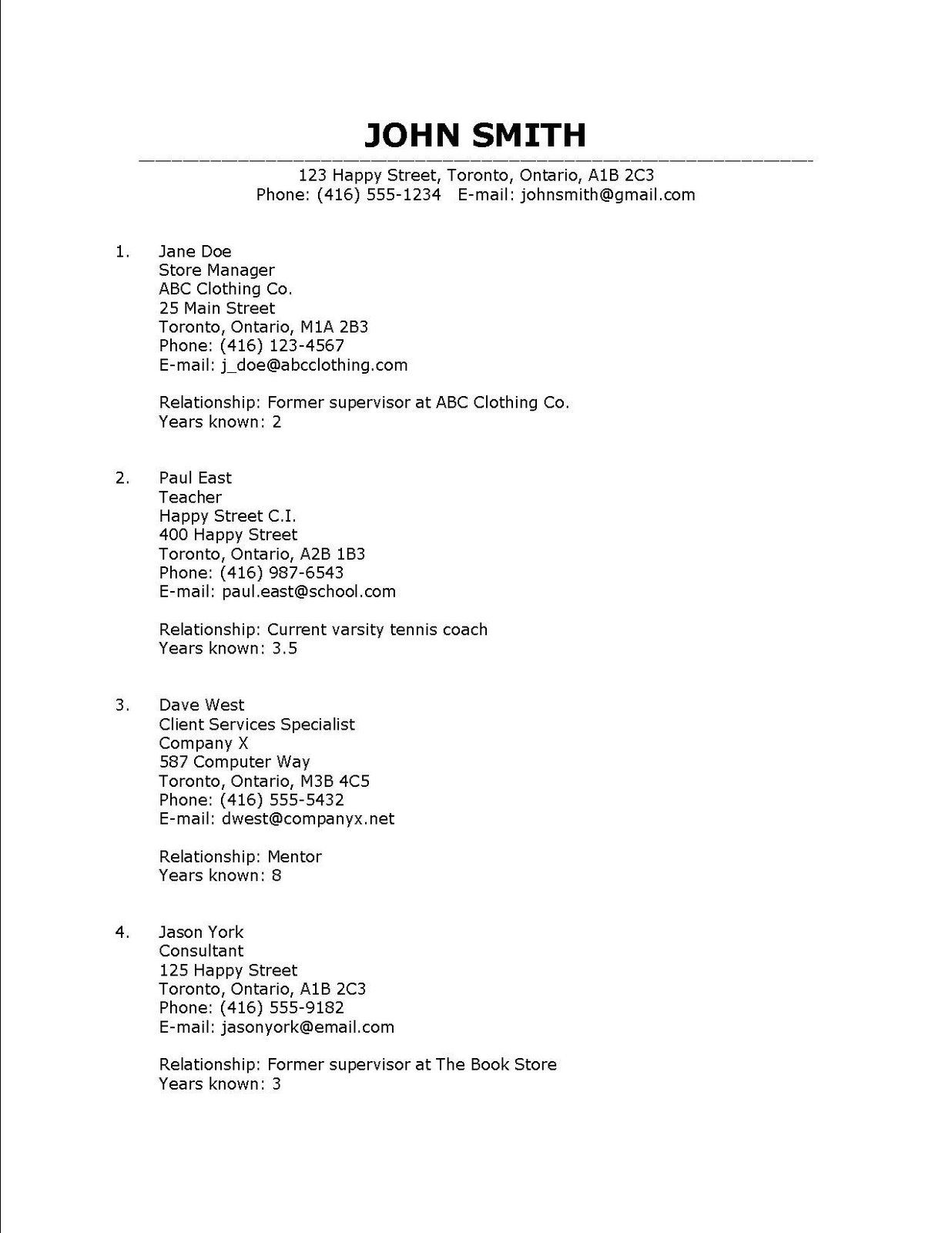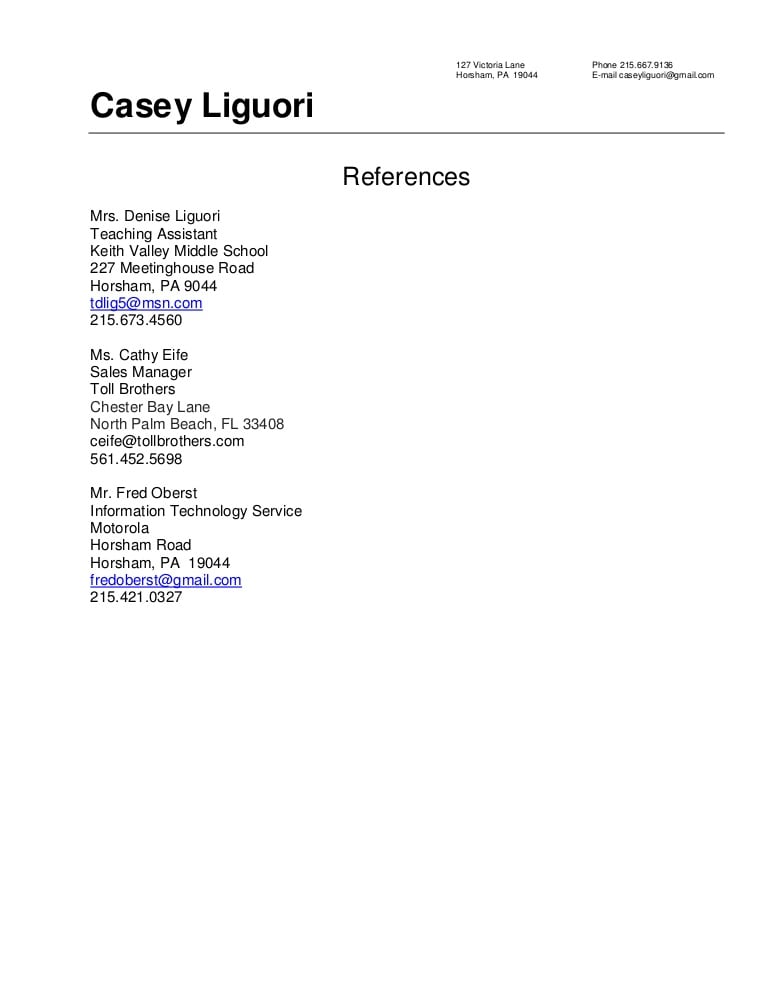Basic References Template For Your Resume
Going with a separate list? Heres how you put it together.
| Reference name |
555-5555
Elon was my boss during my stint at SpaceX from 2007 to 2011. I was part of the team that launched the first privately funded, liquid-fueled rocket to reach orbit.
Such a lucky break having Elon as your reference, right?
Things can be a lot less favorable
The only disadvantage of using the same old resume template for references like this is that its generic. Since its traditional and the hiring managers are used to seeing it thousands of times, you wont be making a strong impression.
Instead, well show you a stronger alternative.
Making A Reference List
Select Your Resume References
When selecting resume references, consider people who can speak to your best qualities, skills and qualifications. If possible, choose people who can discuss talents specific to the job youre applying for.
Generally, the best people to include as references are:
-
Current or former manager or direct supervisor
-
Current or former co-worker
-
Current or former employees/direct reports
-
Academic advisor
-
Professional mentor
When thinking through who to include on your reference list, make sure you are comfortable with these people knowing you are looking for a new job, especially if they are someone you currently work with.
Related: How to Request a Business Reference
Recommended Reading: Gpa On Resume Or Not
How To Provide References For A Job
- / By Biron Clark
If youre looking for how to provide references for a job , then youre in the right place.
Im going to walk you through everything you need to know about giving professional references for a job on your resume, on applications, after the interview, and when recruiters ask.
Ill also cover the mistakes you need to avoid if you want to get hired.
Lets get started
Who Do You List As A Reference

Each candidate will need to consider their personal experience and at what stage they find themselves in their career to decide who to use as a reference.
Who to ask for a reference depends on these aspects because there will be a variety of possibilities for different jobseekers.
- For example, jobseekers with a student resume may not have much professional experience in the working world but still have a selection of possible individuals to ask for references such as guidance counselors, tutors, advisors, coaches and of course teachers or professors from their academic career.
- Whereas entry-level resume candidates may have some professional experience and wish to use former colleagues or managers. Another possibility is a project, master or doctorate supervisor from their most recent studies who will know the candidates dedication and interests well.
- For professional resume applicants this step of the job application may be easier as their network of contacts will be more accustomed to giving and requesting references and will therefore know what is useful to mention as well as how the candidate in question behaves in a workplace environment.
It is highly unconventional and discouraged to use family members or friends as references. This is simply because they will not be objective in giving their opinions and generally do not know the candidates working practices or abilities.
Read Also: When Sending A Resume Via Email What To Say
What Are References On A Resume
References include the contact information of professionals within your network who can act as a witness to your abilities, work ethic, and character. Often, individuals ask former employers, managers, teachers, and colleagues or peers to act as their references. Employers may contact these references via email or phone to ask specific questions about your qualities. These questions usually involve credentials and qualities that the employer lists on the job posting. Some professionals include references on their resumes to prepare for the possibility that the hiring manager may need them.
Employers value references because they can get a third-party opinion on the value you may bring to their team. Checking references may be the last step a potential employer takes before offering you a job, so preparing a list of people who can vouch for your work is crucial when looking for new opportunities.
Related:Key Steps To Asking for a Reference
No You Are Not Supposed To Put References On A Resume
When it comes to writing your resume, you only get so many pages to work with don’t waste that space by putting a list of references or adding the phrase References available upon request at the end of your document. Employers usually won’t ask for this information until you’re further along in the interview process, and they know you’ll provide references if they request them.
Recommended Reading: What To Say When Sending A Resume Via Email
How To Format Your Resume Reference Page
The best and easiest way to set up your job reference sheet is to simply match it to the structure of your resume.
What does that mean in practical terms?
Example Reference Page Formatted To Match The Job Seeker’s Resume
Start with your resume formatting.
Imagine your resume was structured like this sample resume for the made up job seeker Jane Somebody.
Notice the job seeker’s name and contact information is formatted in a header that is centered on the page. The headings are bolded and in all capitals.
To created a set of job search documents that look like a pulled-together, professional package, you simply need to carry the same style through to your resume reference page.
Also Check: How Much History On Resume
How Many References Should You Include
When youâre asked to provide references, you should list three to four people who can attest to your professional experience and skills. If a professional reference isnât available, you can ask unrelated friends and acquaintances to serve as a character reference.
Rather than include your referencesâ contact information on your resume, itâs standard practice to create a separate list, and submit it as a PDF or Word document via email , using the same font and design details as your resume to create cohesion.
A reference tends to be a phone call or email that takes place during a job search. A letter of recommendation tends to be a one-page letter thatâs required for college and scholarship applications.
Professional Vs Personal References
Professional references are people who have seen your work first-hand and have been colleagues, bosses, or supervisors in past jobs. . If youre an entry-level candidate, then your professional references can be professors/teachers.
On the other hand, personal references are people you know personally. This could be a former sports coach, family friend, or any other personal contact who can speak to your character and personality traits
When choosing personal references for a job, pick people who know you well and like you. Theyll be able to speak highly of your character and personality traits, which will help you get hired.
Don’t Miss: How To Make A Teenage Resume
Who To Ask For References If Youre A Seasoned Professional
- Past employers. They can vouch for your work skills, overall performance and describe how you interact with colleagues and supervisors.
- Direct supervisors. They know you the best and can vouch for you when it comes to your transferable skills and work ethic.
- Professional mentors. They have a solid understanding of your personality and receptiveness to training and feedback.
Also, think about the relevancy of your reference. How recent is it? Does it come close to the nature of the job youre applying for today?
Rrecent references should naturally be your first choice. Using someone you worked with years ago as a reference may look like youre trying to hide something.
But if an older reference is more relevant to the job youre applying for now, dont hesitate to put it on your resume regardless of age.
Warning: The Hidden Reason Recruiters Ask For References

Recruiters from staffing agencies will often ask for a list of professional references in the first conversation as a way to build their network and find even more job seekers to work with.
Theyll call the references and ask a few questions about you, but also try to build a relationship so they can represent that person in their job search next time theyre looking for a change.
So, be aware of this, and dont let recruiters get your references before youve spoken with an employer directly! This is yet another reason to tell them you do not give references before having an interview and knowing if the employer is interested in your background.
Also Check: How To Upload Resume On Indeed
How To List References On A Resume
Youve applied for an office position. You cant wait to get an interview with the HR department.
Everything seems good to go, but now, the HR asked you for a list of your references.
So, how do you do this?
Are you supposed to attach it to your resume? Who do you include in your resume references? Is there a custom format style?
Well, kick back and relax because were here to help answer all your uncertainties!
Read on to learn everything you need to know about listing references on a resume.
This guide is going to teach you:
- Whether you should or shouldnt put a reference sheet on your resume.
- How to properly list references on a resume .
- The best way to format a References section.
- Helpful resume references examples.
When And Why Employers Want References
During the job application process, you will most likely be asked for references who can attest to your qualifications. The company may want to verify your credentials and speak to your reference givers to gauge your ability to do the job well.
Typically, this request occurs either when you submit your job application or later in the application process, when the hiring manager is close to making their decision.
The employer will typically specify how many references to include on your list, as well as what contact information you need to provide for each reference.
You will need to format your list of professional references either to include with your application materials, give to the interviewer, or else to email to the hiring manager later on in the hiring process. The employer will typically advise you on how and when to provide references.
As with all communication with a potential employer, from cover letters to thank-you notes, your list of references should be formatted professionally, easy to read and understand, and free of any typos or errors.
Recommended Reading: How Many References Should You Have On Your Resume
Should I Put References On A Resume
The answer to whether or not to put references on your resume can vary.
The general rule of thumb when is actually to not include references on your resume.
This is because employers are unlikely to reach to references until the interview phase, making the inclusion of them on an initial resume typically unnecessary.
This does not mean that there are never scenarios in which you will need to know how to properly list references.
For specific jobs and in certain situations, you may be asked or required to include a list of references within or alongside your resume.
When you need strong references, it’s important to structure them so that they stand out and impress the hiring manager, landing you the pivotal interview.
In this guide, we will be covering the basics of how listing references on your resumes and when to know itâs time to use references.
Plus, we will discuss alternatives to sending references that can help you in situations where sending a reference may be a difficult task.
Decide Whether To Add References To Your Resume
If you are unsure whether you should include references on your resume, the answer is most likely no. Only include references if the employer has specifically stated that they want to see them. Putting them directly on your resume can take up space, so put them at the end if the job post asks for references.
Otherwise, wait for the hiring manager or recruitment officer to explicitly request your list. You should have a well-formatted and presentable reference list ready for when this happens. You also do not need to fill up space on your resume by writing that references are available upon request. Employers generally assume this, and they ask for a reference list when and if they need it.
Also Check: How To Add Projects In Resume
What About References Available Upon Request
So, you know now not to put actual references on a resume, but
What about that oft-quoted phrase resume references available upon request?
This is a notoriously common line many people add to their resume footer.
Dont add this phrase, because:
- It is already impliedOf course your professional references will be made available to the employer upon their request.
- It looks awfully terribleLike back in school if everyone copied the same wrong answer for their assignment. Dont copy this ill-advised line onto your resume.
- It takes unnecessary spaceEvery square inch of your resume is valuable. Save room by using this to add an infinitely more relevant certification or language to your resume.
In our resume writing tips, this is one of the foremost mistakes to avoid.
Speaking of mistakes on resumesanother no-no is confusing personal references with the professional ones:
What Is The Difference Between A Personal And Professional Reference
Personal references include people like your friends and family members. Professional references are working professionals youve met in a formal setting, like at school or work. Generally, youll want to choose professional references over personal references on a resume for two reasons. First, professional references give you credibility because they have seen how you perform at work or school. Second, they are less likely to be biased. Only include personal references if you have no work experience and have no other options. Even then, you should choose your references wisely.
Read Also: How To Save Resume On Ipad
Should I Include References On A Resume
In most cases, no. You should not waste space on your resume by including references. The exception is when the job listing specifically asks that you include references on your resume. Typically, job applications have form fields designated for listing references if the employer wants them. Instead of listing references on a resume, use that space for accomplishments, additional skills, or a creative introduction.
When To Put References On A Resume

So, if it is typically not expected to have references included on an initial resume, when is the best time to include references on a resume?
Creating a reference section or page can be necessary depending on a number of situations, including:
- If the employer has specifically requested for references to be included in the job description
- If you have progressed further down the hiring process and have been asked to provide references before or after an interview
- If you are applying to governmental or institutional position, such as a federal job, that will require strong references and a background check
Quick Tip: If you have impressive references, such as a company CEO or another recognizable figure, be sure to make these the most noticeable references and the first ones you list in your reference section.
Overall, the golden rule is to wait to provide references until they are requested.
Don’t Miss: Corvette Tour
When To Write References On A Resume
Some professions are more likely to be accepting of references on the resume. These include:
- Academics: Especially professors, teachers, students applying to college or university and academic researchers, and who may even be writing functional resumes
- Candidates with little work experience: References help to bulk out the resume and also allow a HR Manager to find out more about your personal profile due to the lack of work history on the resume
- Government positions: A resume is not usually the standard form of application for government roles but you may be expected to write your references on their application form
Should You List References On A Resume
Itâs best to use the space you have on your resume in more productive ways, but collecting references to have on hand is a proactive step you can take in your job search.
Although it used to be common practice to list at least two references on your resume, itâs since become unnecessary in the digital age. But if youâre actively searching for a new job, it can help to proactively collect references so youâre prepared in case an employer asks for that information.
Letâs go over why employers need references, why itâs not necessary to list them on your resume, and tips for asking someone to serve as a reference.
Recommended Reading: How Many References Should I Include